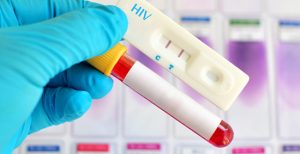April 9, 2021
Cost-effectiveness analysis leading to updated WHO maternal HIV retesting guidelines published in JIAS

HIV rapid test and a blood sample vial (Credit: American Psychological Association)
A new manuscript by Global WACh researchers, trainees, and collaborators was published in the Journal of the International AIDS Society (JIAS) last week. The publication summarized the findings of the study, “Optimizing HIV retesting during pregnancy and postpartum in four countries: a cost-effectiveness analysis,” which examined the cost, impact, and cost-effectiveness of maternal HIV retesting timing and frequency in four countries—Colombia, Kenya, South Africa, and Ukraine.
The authors found that retesting in late antenatal care is cost-effective in Kenya and South Africa. They also found that HIV retesting alone is not sufficient for the elimination of mother-to-child transmission, highlighting the need for additional HIV prevention interventions for pregnant and postpartum women. This analysis informed recent updates to the World Health Organization’s (WHO) guidelines for HIV testing during pregnancy and postpartum, of which Global WACh and other UW researchers led a series of systematic reviews in 2019. Readers can access the updated guidelines on the WHO’s website or as a mobile app on Apple and Android devices for on-the-go access. Following the results from this study, the authors are examining whether optimal HIV retesting timing and frequency differ for key populations compared to the general population.
Julianne Meisner (PhD student, Epidemiology) and Allen Roberts (PhD student, Epidemiology) are co-first authors and Dr. Alison Drake (Assistant Professor in Global Health and Epidemiology) is the senior author. Global Health faculty Drs. Ruanne Barnabas and Monisha Sharma are contributing authors. Click here to read the article in JIAS.